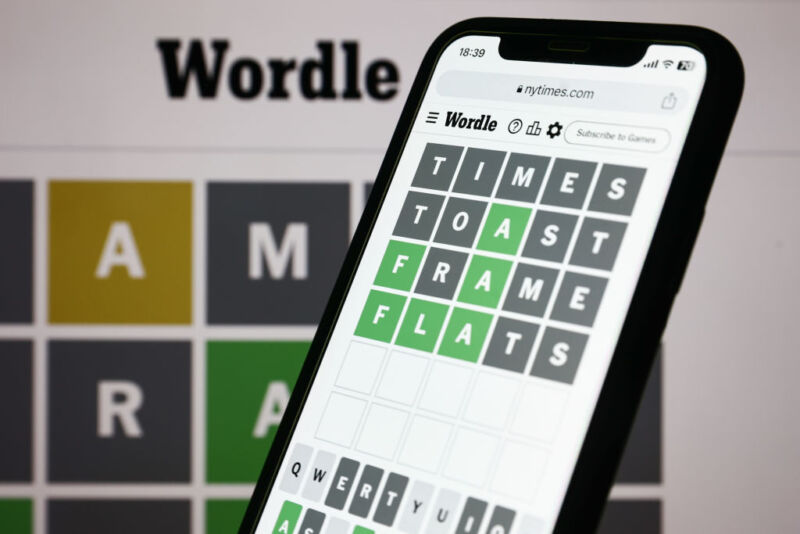
The New York Times is fighting to take down a game called Worldle, according to a legal filing viewed by the BBC, in which The Times apparently argued that the geography-based game is “creating confusion” by using a name that’s way too similar to Wordle.
Worldle is “nearly identical in appearance, sound, meaning, and imparts the same commercial impression” to Wordle, The Times claimed.
The Times bought Wordle in 2022, paying software developer Josh Wardle seven figures for the daily word-guessing puzzle game after its breakout success during the pandemic. Around the same time, Worldle was created—along with more than 100 other Wordle spinoffs offering niche alternatives to Wordle, including versions in different languages and completely different games simply using the name construction ending in “-le.” The Times filed for a Wordle trademark the day after buying the game and by March 2022, it started sending takedown requests.
Today, millions visit the Times site daily to play Wordle, but the Times is seemingly concerned that some gamers might be diverted to play Worldle instead, somehow mistaking the daily geography puzzle—where players have six chances to find a Google Street View location on a map—with the popular word game.
This fear seems somewhat overstated, since a Google search for “Worldle” includes Wordle in the top two results and suggests that searchers might be looking for Wordle, but a search for Wordle does not bring up Worldle in the top results.
Despite Google seemingly favoring the popular game in results and likely because of Wordle‘s enormous success, The Times’ litigiousness over the Wordle brand seems to be rising this year as the company looks to rapidly expand its profitable games platform to increase subscriptions. In March, 404 Media reported when The Times began more aggressively taking aim at hundreds of Wordle clones, sending DMCA notices to defend the Wordle trademark.
Some developers, like Chase Wackerfuss, the creator of Reactle, immediately took down their games, feeling it wasn’t worth getting into an intellectual property (IP) battle with the Times, 404 Media reported. The same thing happened with the Wordle Archive, which confirmed in 2022 that access to previous Wordle puzzles was shut down because “sadly, the New York Times has requested that the Wordle Archive be taken down.”
“To me, Wordle is like Tetris or a deck of cards. It’s such a simple premise,” Wackerfuss told 404 Media. He pointed to unique games that wouldn’t exist without building on Wordle‘s premise, including “a Taylor Swift version, a version in all different types of languages. The New York Times would never build those, so I’m not sure why they feel like we’re encroaching on their IP.”
But Worldle’s developer, Kory McDonald, is not backing down just because the Times threatened legal action.
McDonald told the BBC that he was disappointed in the Times targeting Worldle. He runs the game all by himself, attracting approximately 100,000 players monthly, and said that “most of the money he makes from the game goes to Google because he uses Google Street View images, which players have to try to identify.” The game can only be played through a web browser and is supported by ads and annual subscriptions that cost less than $12.
“I’m just a one-man operation here, so I was kinda surprised,” McDonald told the BBC, while vowing to defend his game against the Times’ attempt to take it down.
“There’s a whole industry of [dot]LE games,” McDonald told the BBC. “Wordle is about words, Worldle is about the world, Flaggle is about flags.”
It’s not clear how strong a case the Times would have to enforce the takedown or if it will target other “-le” games next. The list of potential next targets is long and includes a completely different game also called Worldle, where players guess the country based on its outline. Wackerfuss told 404 Media in March that it seemed like the Times was chasing down every lead.
The Times is not commenting on the legal action, the BBC reported, but in the past has targeted Wordle clones that either use the Wordle trademark or its copyrighted gameplay without authorization or permission.
Because McDonald’s game has vastly different gameplay than Wordle, the Times may be limited to only arguing that the similar-sounding names are creating confusion for an average user.
Now it seems possible that McDonald’s fight, if successful, could encourage others to resist takedowns over the Wordle trademark.
McDonald doesn’t think that “world” sounding too much like “word” is an issue, but even if the Times wins the fight, he intends to keep his game online.
“Worst-case scenario, we’ll change the name, but I think we’ll be OK,” McDonald told the BBC.
